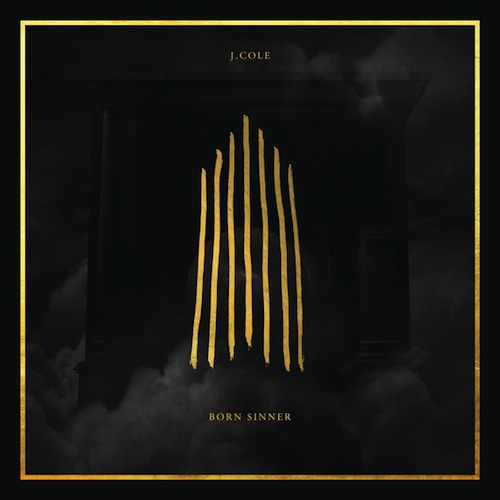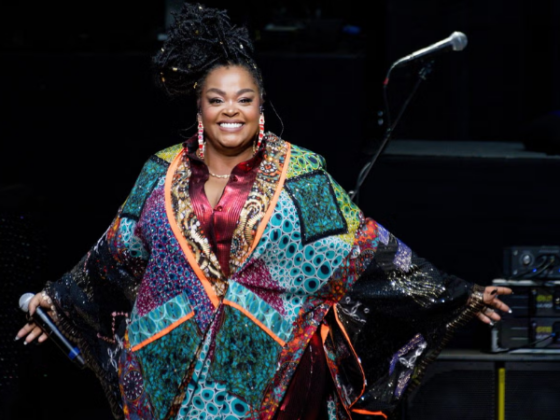Born Sinner is struggle music. It is melancholy and frustrated and no fun to listen to. From the moment J. Cole announces that it’s way darker this time—about 15 seconds in—to the album’s climax (which happens to be a song about one of the lowest moments of his young career), there’s very little to feel good about.
As the curtain rises on this ominous, anticlimactic melodrama two things immediately become indisputably clear: every single tale of success is shadowed by a self-imposed guilt trip and the music that accompanies each tale more or less serves no purpose. There are no thought-provoking records, no conscious records, and there’s nothing even remotely provocative. There’s nothing on the album you can dance to, and there’s nothing built with intent to rattle subwoofers; it is one tone and one tone only and that’s monotone—one shade and that’s gray. There is seldom a positive outlook on anything (the sole exception being “Crooked Smile”), and when you find one the moment is fleeting. Chances are, the weather is overcast over every single display carrying this CD. I’m a bit bitter just thinking about it.
J. Cole is very good at being okay (credit: Jayson Greene). Even worse, though, is that he’s become very bad at being entertaining. There is no spontaneity to his work. His records now go through a perpetual and predictable cycle creating this formula (SPOILER ALERT!):
opposing unnamed adversary (or) absent father (or) manipulative woman (or) hater + the burden of accomplishment + (at least) one cringe-worthy bar + rapper name drop + a connection to his past = struggling with change.
There are no other variables and there is no other outcome. It is a rigid structure that makes his music almost impossible to enjoy.
In the wake of the colossal critical failure that was Cole World: The Sideline Story (an album that had very little margin for error), there aren’t overwhelming expectations for Cole’s sophomore effort. Cole desperately needs a win, and while it still remains to be seen if he’ll get one here, this album certainly wont stand the test of time regardless of its short-term success. It was never about the short-term for Cole; since his sophomore mixtape (and Roc Nation debut) The Warm Up, it has always been Cole vs. history. There was once talk of the rapper one day standing with Drake at the helm of the genre, but such talk has since ceased. Drake has a certain charisma that Cole lacks and it has manifested itself greatly in the two very different career paths. Even as Cole slowly continues to emerge as a commercial star, very few would dare put him in the same category as Graham now. This is because, quite frankly, no one sees J. Cole as a long-term commodity anymore; his stock has dropped considerably. This is a truth further emphasized by Born Sinner.
Even in creating a solid album, J. Cole can’t win for losing. The album’s title is drawn from a quote of the late Notorious B.I.G.—a quote that is sampled in the opening seconds—and the immortal words of the slain rapper serve as the backbone of the entire project. “Born sinner, the opposite of a winner…” The original quote was used as a representation of Biggie’s past, but the sample seems more a representation of Cole’s present. “Juicy,” the song from which the sample originated, was Biggie’s rags-to-riches story, and it worked because, through his magnetic story telling, you felt like he won. Ironically, this album’s attempt to replicate the rags-to-riches story comes across rather unsuccessfully in the wake of too few moments of triumph.
The album does have its moments, though, like the Kendrick Lamar-assisted “Forbidden Fruit,” which finds Cole in a groove both literally and figuratively. “Rich Niggaz” is an interesting perspective on the success of others, and may be one of Cole’s most endearing beats in a long time. “Power Trip” has emerged as a viable lead single, but there aren’t many singles outside of that, and that’s a good thing. The album wins points for cohesiveness.
Born Sinner’s climax, however, as mentioned in the opening paragraph, is “Let Nas Down,” and it is just one of many indicators that when Born Sinner isn’t about strife it is often more about the legendary rappers of the past and present that shaped Cole’s future than about Cole himself. How many more lines must we stomach about Jay-Z nearly passing up on him? How many more times is he going to name-drop an all-time great? He wants to be great so badly that it’s practically all he talks about. But, there’s a difference between talking the talk and walking the walk. He raps well, and means well, but his methods are tired.
When you get past the posturing, it’s clear there is nothing exceptional about this album, nothing that warrants a repeat listen. We predicted big things too soon, and now he’s suffering the consequences; the project reeks of an artist trying too hard to reach a bar that may have been out of his reach all along. While the album is far closer to what we initially expected from Cole when compared to his previous effort, it still falls short of his capabilities—or perhaps just our early perception of his capabilities. It may be time to accept that J. Cole is just another rapper. Born Sinner is a microcosm of an overestimated career.









